Dominic Giroux, Hôpital Montfort President and CEO and OHA Board Chair, addresses hospital leaders during the Health Care Leadership Summit held in May 2023.
Thanks to a Team Ontario approach and the leadership of the province's hospitals, Ontario was able to perform better than many jurisdictions at preventing deaths and reducing human suffering during the COVID-19 pandemic. However, the pandemic brought profound changes and greatly destabilized health care systems around the world, including Ontario's. With hospitals continuing to face extraordinarily demanding conditions, including serious capacity pressures, the Ontario Hospital Association (OHA) has shifted from supporting hospitals with the pandemic response to seeking stability for the sector.
To help meet rising demand for care, OHA advocacy focused on keeping hospitals financially whole and on identifying solutions to address the challenging health human resources (HHR) shortages facing hospitals. In addition to pandemic and HHR recovery, the OHA is also working with government and other stakeholders on future health system planning.
The unique spotlight of the pandemic raised questions about hospitals' future role, not only as part of the province's health care system, but also in broader society. Conversations about the kind of leadership required to navigate and adapt to the changing expectations and responsibilities facing hospitals were at the heart of this year's Health Care Leadership Summit, held in person for the first time in three years.
This is the OHA's first year under its new strategic plan. Launched in April, the plan builds on the OHA's core mandates, which include playing a key role in creating a better-connected system for the province, as well as timely themes like HHR, governance and equity, diversity, inclusion, and anti-racism. The 2023-2027 plan also highlights a renewed focus on member engagement and knowledge transfer and new priorities that align with the OHA's mandates and members' changing needs, such as Indigenous Health.
Following several years of adaptation, the OHA now has a stable, strong foundation to serve members effectively. The OHA looks forward to celebrating a milestone anniversary in 2024, marking 100 years since our establishment, and we remain strongly committed to supporting hospitals' evolution, innovation and leadership as the system transforms.
Protecting Access to Care by Stabilizing the Sector
Pre-Budget Advocacy
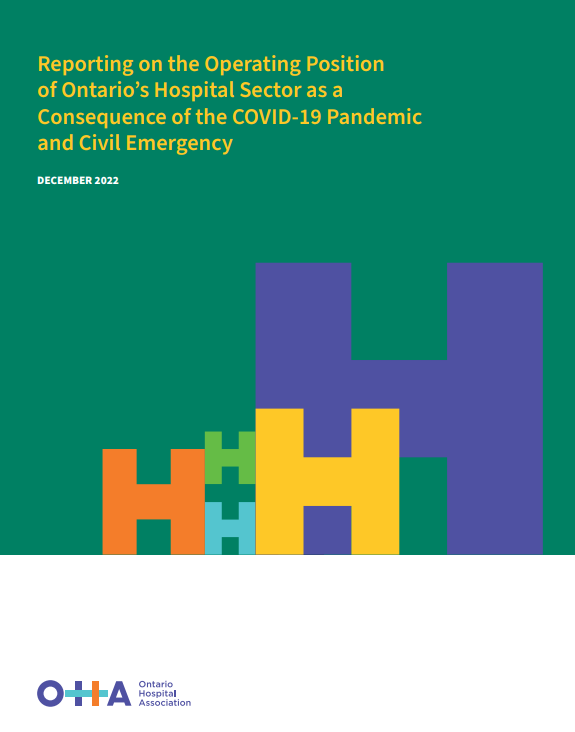 In fall 2022, the OHA convened its Pre-Budget Advocacy Advisory Group to inform the development of a foundational paper (member login required) to guide pre-budget advocacy efforts. The paper outlined the operational and financial pressures facing hospitals as a result of COVID-19 as well as pre-pandemic challenges with hospital funding and capacity. As in previous years, the OHA recommended that hospitals be kept financially whole for the 2023-24 fiscal year with investments necessary to tackle financial pressures in four key areas: addressing the backlog of care and meeting the needs of a growing and aging population; rising overall hospital expenses due to inflationary pressures; labour costs; and pandemic-related expenses which are now part of normal operations.
In fall 2022, the OHA convened its Pre-Budget Advocacy Advisory Group to inform the development of a foundational paper (member login required) to guide pre-budget advocacy efforts. The paper outlined the operational and financial pressures facing hospitals as a result of COVID-19 as well as pre-pandemic challenges with hospital funding and capacity. As in previous years, the OHA recommended that hospitals be kept financially whole for the 2023-24 fiscal year with investments necessary to tackle financial pressures in four key areas: addressing the backlog of care and meeting the needs of a growing and aging population; rising overall hospital expenses due to inflationary pressures; labour costs; and pandemic-related expenses which are now part of normal operations.
These efforts included productive engagement with the Hon. Sylvia Jones, Deputy Premier and Minister of Health, senior leadership from the Ministry of Health (Ministry), and senior staff in the Minister's Office, and meetings with the Hon. Minister of Finance Peter Bethlenfalvy, the former President of the Treasury Board, the Hon. Prabmeet Sarkaria, and staff from the Premier's Office. Additionally, the OHA supported members with a suite of resources to assist with their local outreach. In the 2023 Ontario Budget, the government announced an increase of approximately 4%, or $850M, for hospitals, which included funding for the Small and Northern Stabilization Fund, surgical and diagnostic imaging, neurosurgical, interprovincial billing impact funding, and other investments.
This August, the OHA struck a new Board Committee on pre-budget advocacy ahead of the 2024 Ontario Budget. The Committee will provide advice on the OHA's pre-budget recommendations and advocacy approach with pre-budget discussions set to begin in fall 2023.
Federal Advocacy: Over the past year, the OHA has expanded its advocacy efforts with the federal government to advance important priorities for the sector – in particular, promoting greater investment in hospital-based research. Outreach has included pre-budget submissions to inform the Government of Canada's 2023 and 2024 Budgets and ongoing engagement with key decision-makers to strengthen the OHA's relationship with the government. The OHA's pre-budget recommendations to government, submitted in October 2022, called for enhancements to the Canada Health Transfer (CHT) by increasing the federal contribution as well as the amount of the annual CHT automatic escalator to account for inflation and demographic factors.
Funding and Sustainability
With hospitals across the province facing significant cost pressures, one of the OHA's key priorities was seeking financial stability for the sector. To support its advocacy efforts and ensure information and funding flows in a timely manner, the OHA led several important data collection initiatives in addition to ongoing monitoring of hospitals' financial position, which included capturing the significant financial impact of Bill 124 re-opener awards for both unionized and non-unionized employees.
The OHA continues to work closely with the Ministry, Ontario Health (OH), and partners across government, including through the Hospitals Advisory Committee (HAC) which reconvened in October 2022. Co-chaired by the OHA, OH, and the Ministry, HAC developed a list of priorities and recommendations for the 2023-24 fiscal year that included the need for enhanced funding flexibility, additional capital investments, and funding for pandemic-related expenses. In November 2022, the OHA held a member call where Minister Jones committed to these recommendations. The HAC also held special meetings in 2023 to ensure that all partners recognized the magnitude of the fiscal pressures facing the sector, and the support required to maintain financial stability.
We saw a number of significant government commitments in the summer of 2023. This included an additional $44M to support emergency department wait time reductions, as well as an annual funding increase of $330M for paediatric care. In June, the Ministry confirmed financial support for hospitals affected by re-opener retroactive arbitration awards related to the Ontario Nurses' Association (ONA) and other equivalent non-bargaining nurses. In the fall, the Ministry expanded its financial support to include arbitration awards for the years 2020-21 to 2023-24 covering unionized and equivalent non-unionized hospital staff, as well as non-executive management.
The OHA also engaged extensively with OH and other system partners to ensure that the 2023-24 approach to Service Accountability Agreements (SAA) recognized the need for stability and to enlist support for a centralized and streamlined balanced budget waiver approach. At the request of OH, the OHA convened a select group of CEOs and Chief Financial Officers to provide feedback on the 2023-24 Hospital-SAA indicator changes and processes.
In October, the OHA is hosting the Health Care Financing Forum to explore international funding methodologies and integrated models of care to support Ontario in taking a unified, leadership role in anticipation of future challenges
Addressing Health Care Workforce Pressures
Overcoming HHR pressures continued to be a top advocacy priority, with ongoing engagement with Minister Jones and her policy team. In December 2022, the Government of Ontario announced further HHR investments aligned with short-term recommendations advanced by the OHA. The OHA also engaged with Dr. Karima Velji, Ontario's Chief of Nursing and Professional Practice and Assistant Deputy Minister, facilitating a dialogue between her and the OHA's Nursing Leadership Table. Since fall 2021, the OHA has also been administering the HHR Workforce survey to inform its advocacy and provide decision-makers with timely data from the field on vacancy rates and turnover, with the latest survey conducted in spring 2023.
 The OHA continues to work across the sector and with system partners as part of its academic mandate to inform discussions with government related to clinical nursing placements in hospitals, which are the largest provider of clinical placements for nursing students. Discussions have been informed by the OHA's Clinical Placement Capacity in Nursing survey. In parallel, members of the OHA's Education Committee administered a related survey to Ontario post-secondary education institutions offering nursing programs to better understand their clinical placement needs. In August 2023, the OHA launched a new Undergraduate Nursing Preceptorship Costing survey to provide insight into the funding supports required by hospitals.
The OHA continues to work across the sector and with system partners as part of its academic mandate to inform discussions with government related to clinical nursing placements in hospitals, which are the largest provider of clinical placements for nursing students. Discussions have been informed by the OHA's Clinical Placement Capacity in Nursing survey. In parallel, members of the OHA's Education Committee administered a related survey to Ontario post-secondary education institutions offering nursing programs to better understand their clinical placement needs. In August 2023, the OHA launched a new Undergraduate Nursing Preceptorship Costing survey to provide insight into the funding supports required by hospitals.
The Ontario Medical Association's (OMA) Negotiations Task Force has also invited the OHA to provide input and identify priorities for the 2024 Physician Services Agreement (PSA) with negotiations set to begin in October 2023. The OHA will be seeking feedback from Physician Leadership Network (PLN) members. The Ministry and OMA negotiations teams have also invited the OHA to discuss priorities and areas of interest. Additionally, both the OMA and Ministry requested the OHA's support in building and administering a survey that will help guide the creation of a Hospitalist Alternative Payment Plan, a key priority from the 2021 PSA.
New and Ongoing Advocacy
In summer 2023, the OHA established new time-limited advisory groups to gather valuable input and advice about the challenges hospitals are facing in order to identify solutions and mitigations.
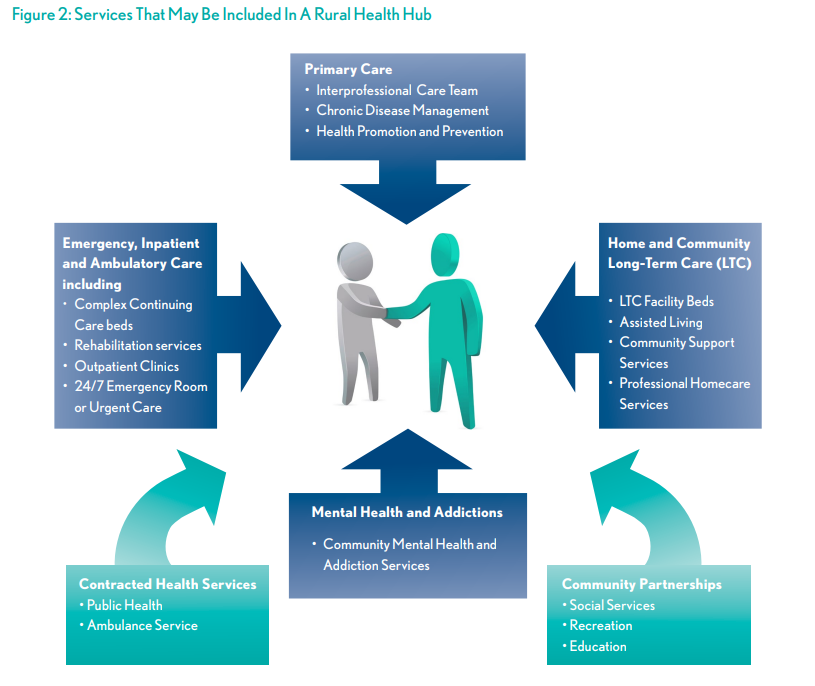
The OHA Small, Rural and Northern (SRN) Emergency Department Strategy Advisory Group was convened to assess, refine and modernize a strong body of existing work that seeks solutions to the complex challenges facing SRN hospitals, such as the Rural and Northern Health Care Framework and rural health hubs. This group will help guide the OHA's advocacy efforts towards an emergency health care system that offers high-quality, sustainable and equitable care, particularly to SRN communities and Indigenous populations.
- A multi-stakeholder Uninsured Patients Program Advisory Group will put forward recommendations to help inform equitable access to health care services by certain uninsured persons living in Ontario.
Recognizing the ongoing challenge that hospitals face in attracting and retaining qualified individuals for leadership positions, and that skilled leadership matters more than ever before, the OHA Board established a Special Committee on Hospital Leadership Recruitment and Retention to explore the range of issues and possible solutions in this area.
Over the last year, the OHA has been active on a wide range of legal and regulatory issues including developments related to Bill 7, More Beds, Better Care Act, 2022; a legislative review of the Accessibility for Ontarians with Disability Act; “As of Right" rules for out-of-province health care workers; broader public sector procurement regulations; the anticipated expansion to medical assistance in dying; and a number of other regulatory amendments impacting hospitals, such as changes to scopes of practice.
The OHA also developed a submission in response to the Ministry's review of the Personal Health Information Protection Act, 2004 (PHIPA) and its regulations which it initiated in December 2022. As part of its consultation efforts, the OHA held two virtual workshops with hospital privacy leads and the Ministry, convened its Health Research and Innovation Committee, and also sought feedback from legal counsel, physician leaders and senior executives across Ontario hospitals.
Since the government's January 2023 announcement regarding the expansion of capacity in community diagnostic and surgical centres, the OHA has been actively engaged on the issue through continued discussions with government and by responding to legislative and regulatory developments designed to implement the expansion. The OHA sought input from the Board and members to inform its ongoing advocacy as well as final recommendations for government that were shared with senior leaders at the Ministry and OH. The OHA will continue to advocate on behalf of the sector as the province moves forward with its plan for the expansion of community-based surgical care.
Labour Relations and Benefits
Collective Bargaining: Since fall 2022, the OHA's labour relations efforts have focused on the ONA negotiations that began in January 2023, as well as the re-opener negotiations respecting Bill 124 for ONA, Ontario Public Service Employees Union (OPSEU), Canadian Union of Public Employees (CUPE) and the Service Employees International Union (SEIU). In addition, the OHA reached an agreement with OPSEU in November finalizing the OPSEU central pay equity plan. Since the finalization of the pay equity plan, the OHA has been supporting members with implementation, which is retroactive to April 2007.
The OHA mobilized ONA bargaining preparations much earlier than in previous rounds and initiated broader level of engagement with members, including two CEO engagement sessions and consultation with the OHA's Nursing Leadership Table. This round of negotiations was an important part of a larger, comprehensive strategy to improve the HHR challenges facing the sector. While the parties were unable to reach an agreement, the board of arbitration chaired by William Kaplan issued a final award in July 2023. The ONA renewal award included increases to compensation as well as breakthrough changes regarding redeployment and reassignment provisions that will have an operational and financial impact – a longstanding priority for hospitals. The OHA supported members with the implementation of the ONA Central Interest Arbitration award as well as the re-opener awards issued for the various unions.
In June this year, the OHA also began preparing for 2024 CUPE and SEIU Central Bargaining, with collective agreements ending in September 2023 and December 2023, respectively. Regional consultations with members are scheduled for September 2023.
Provincial Benefits Strategy: Formally introduced to members in May 2022, Healthcare Collaborative Benefits Inc. (Collaborative Benefits) is the new not-for-profit entity that will be responsible for the provincial delivery of a new health care employee group benefits plan. Initiated by the OHA and HIROC Management Limited, Collaborative Benefits began as a sector-wide solution to a common challenge: escalating financial pressures due to the rising costs of delivering employee group benefits. The future plan is a valuable opportunity to deliver health care benefits that have been co-designed by health care providers, using innovative approaches that enable cost-savings, enhanced employer and employee experience and greater efficiency for participating organizations. With strong interest from hospitals, Collaborative Benefits issued the request for proposals (RFP) in March 2023. The RFP award will be issued in fall 2023, and implementation is anticipated to begin in late 2023/early 2024.
Building a Strong Foundation for the Future
Launch of the New Strategic Plan
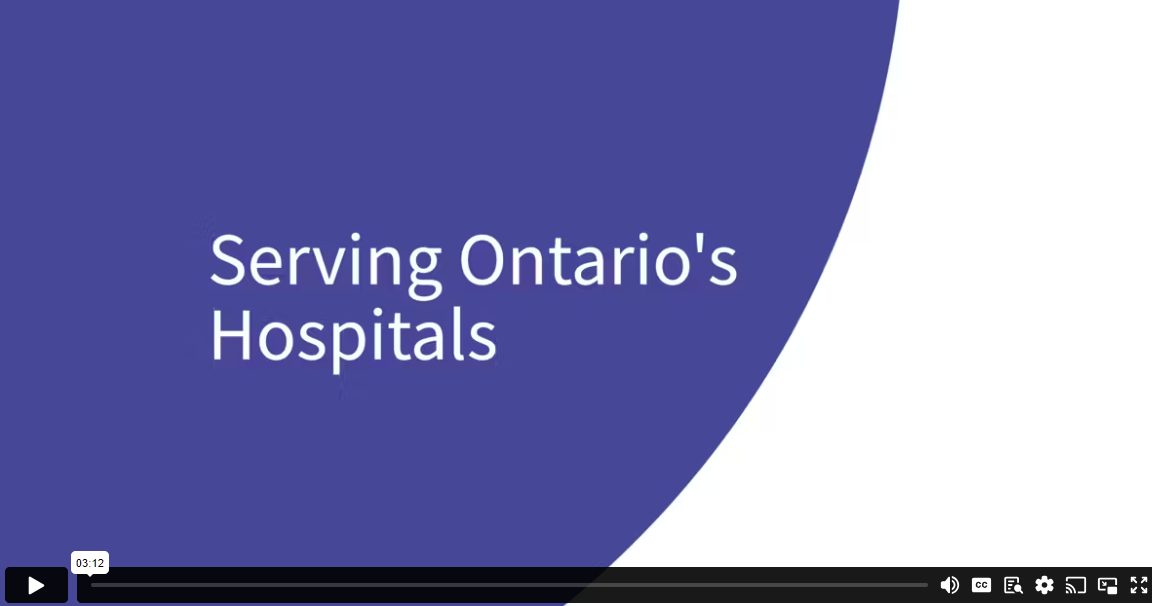 In April this year, the OHA unveiled its new Strategic Plan 2023 – 2027 which represents a natural evolution for the OHA. The Plan embeds lessons learned over the past few years, and bolsters functions members have relied on the OHA to provide for many years while exploring new priority areas aligned with the evolving needs of patients, hospitals, and communities. Guided by a Special Committee of the OHA Board of Directors, the Plan was developed through a two-year process that included several hundred inputs from hospital leaders, system partners, and the OHA staff team. With the new strategic plan in place, the OHA is positioned to lead with confidence and humility in support of hospitals building a reliable, high-performing health care system that focuses on the needs of Ontarians.
In April this year, the OHA unveiled its new Strategic Plan 2023 – 2027 which represents a natural evolution for the OHA. The Plan embeds lessons learned over the past few years, and bolsters functions members have relied on the OHA to provide for many years while exploring new priority areas aligned with the evolving needs of patients, hospitals, and communities. Guided by a Special Committee of the OHA Board of Directors, the Plan was developed through a two-year process that included several hundred inputs from hospital leaders, system partners, and the OHA staff team. With the new strategic plan in place, the OHA is positioned to lead with confidence and humility in support of hospitals building a reliable, high-performing health care system that focuses on the needs of Ontarians.
Health Care Leadership Summit
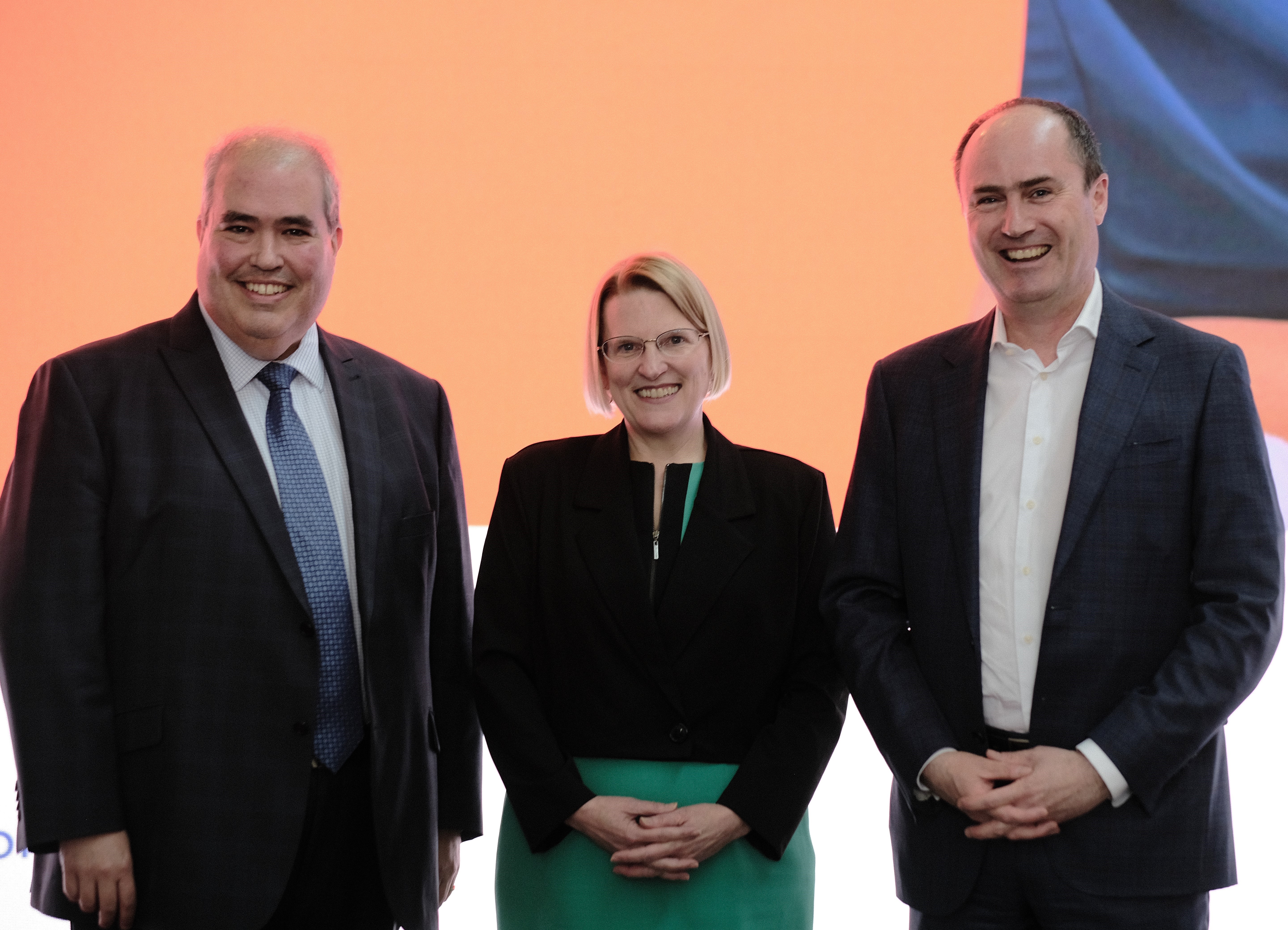 This past May, the OHA's Health Care Leadership Summit (Summit) returned after three years, providing hospital leaders with an opportunity to connect with one another and with the OHA to discuss the most pressing issues facing hospitals and the health care system. The Summit focused on hospitals leading through innovation and playing a key part in reshaping health care for Ontarians. It brought together hospital Board Chairs and CEOs, international and provincial experts, and senior government representatives, including Minister Jones, for thought-provoking and timely discussion about the future role of hospitals in an ever-evolving health care system. Proximity Institute also hosted a deeply engaging session about leadership within Ontario's hospital sector today.
This past May, the OHA's Health Care Leadership Summit (Summit) returned after three years, providing hospital leaders with an opportunity to connect with one another and with the OHA to discuss the most pressing issues facing hospitals and the health care system. The Summit focused on hospitals leading through innovation and playing a key part in reshaping health care for Ontarians. It brought together hospital Board Chairs and CEOs, international and provincial experts, and senior government representatives, including Minister Jones, for thought-provoking and timely discussion about the future role of hospitals in an ever-evolving health care system. Proximity Institute also hosted a deeply engaging session about leadership within Ontario's hospital sector today.
Promoting Investment in Health Research and Education
 At the federal level, the OHA continues its efforts to strengthen investment in hospital-based research. This included pre-budget submissions to inform the Government of Canada's 2023 and 2024 Budgets. In 2022, the OHA led with a recommendation to double the amount of Tri-Agency funding in 2023-24 and out years. And in 2023, the OHA made three recommendations which include implementation of the 21 recommendations of the Advisory Panel on the Federal Research Support System outlined in their 2023 report, increasing the number and value of graduate scholarships and postdoctoral fellowships available through the Tri-Agencies, and doubling the amount of Tri-Agency funding.
At the federal level, the OHA continues its efforts to strengthen investment in hospital-based research. This included pre-budget submissions to inform the Government of Canada's 2023 and 2024 Budgets. In 2022, the OHA led with a recommendation to double the amount of Tri-Agency funding in 2023-24 and out years. And in 2023, the OHA made three recommendations which include implementation of the 21 recommendations of the Advisory Panel on the Federal Research Support System outlined in their 2023 report, increasing the number and value of graduate scholarships and postdoctoral fellowships available through the Tri-Agencies, and doubling the amount of Tri-Agency funding.
The OHA also initiated work to strengthen its relationship with the Government of Canada by enlisting support from key decision-makers. Introductory meetings with key Members of Parliament (MPs) and officials have taken place and the discussion has been very positive. Over the summer, the OHA invited select MPs to tour the research hospitals in their ridings. A joint Lobby Day with HealthcareCAN is being scheduled for fall 2023. Participants will be hearing from health system leaders from across the country about the challenges they are facing, the solutions they are implementing, and the support they and their patients need to create a health system that works for everyone, and a research ecosystem that ensures Canada is a world-class innovator in health sciences.
Data and Analytics
Through a suite of foundational data and benchmarking platforms in finance, HHR, clinical utilization, and patient experience, the OHA is supporting members with innovative data and analytics solutions to meet their changing needs and enable evidence-informed decision-making.
New Nursing Placement Capacity Dashboard: In 2022, the OHA launched the Clinical Placement Capacity in Nursing survey in collaboration with academic teaching hospitals. It was developed to inform advocacy efforts to ensure that hospitals have the supports and resources needed to accommodate these clinical placements. Survey results were shared in March 2023 through the interactive Nursing Placement Capacity Dashboard, and the latest survey was conducted in April 2023.
Patient Experience: There has been strong, positive response to OHA's leadership efforts to modernize how hospitals measure and report on their patients' experiences. In late 2022, the OHA invited hospitals to consider conducting patient experience measurement through Qualtrics XM. As of August 2023, 73 hospitals have acquired a Qualtrics license or are in the final stages of contracting, with the first hospital going live in February 2023. The OHA is supporting hospitals with their evaluation, procurement and implementation efforts, including through the evolution to digital surveying via numerous pre-programed standard surveys. This modernization is helping hospitals hear from more patients faster and helps produce rich and timely insights about where hospitals can focus their improvement efforts. The OHA's strategy also strives to strike the balance between offering hospitals the benefits of standardization for benchmarking and sufficient agility for local customization.
Integrated Decision Support (IDS): IDS is Ontario's most mature and widely used collaborative solution for integrating health services utilization data across health providers. Interest in IDS continues to grow, with over 100 health service providers currently part of the IDS community. Implementation of the remaining hospitals in the OH Central Region is nearing completion and additional Community Health Centre datasets from the OH West and Central Regions are in progress.
Following last year's upgrade to IDS, many new features and dashboards were developed for Ontario Health Teams (OHTs) and sector-specific needs. New reporting tools and dashboards include the ALC Dashboard, QBP Case Costing Dashboard, Population Census Dashboard, and Stroke Distinction Reports. Work with 34 OHTs over the spring and summer has led to enhanced engagement and collaboration, new catchment and indicator flags, and additional partners contributing data into IDS.
Another major development is an update to IDS's 2016 tables following the release of 2021 population census, geography, and Ontario Marginalization tables by Statistics Canada, the Ministry, and Public Health, respectively. Two pilot projects that will expand the view of patients' outpatient and community journey are also underway, adding Hospital Ambulatory Care Clinic data and Community Support Services data to IDS.
OHA leadership and the IDS team continue work on a renewed IDS strategic plan to set priorities for the next few years, guided by stakeholders and the advice of the IDS Governance Committee
Linking Funding to Quality for Mental Health and Addiction Services
The HAC's Mental Health and Addictions (MHA) Funding Initiative is focused on linking funding to quality for mental health and addiction services across the continuum of care, beginning with schizophrenia care. The Schizophrenia Integrated Care Initiative takes learnings from the development of the Mental Health and Addictions Pay for Quality funding approach to create a model that will emphasize quality improvement using evidence from the hospital and community sectors. Four prototypes based on hospital and community partnerships will lead the exploration phase using Ontario Health's Quality Standard for Schizophrenia Care in the Community.
The OHA has taken the lead in introducing patient engagement as a guiding principle for this initiative, with patients and caregivers invited to share their lived experiences throughout the process to ensure that decisions are informed by their input. This approach to mental health funding is revolutionary. Patient perspectives, together with health care provider and funder collaboration, will offer important insights when creating new models incentivizing quality of care. The OHA is also working with the Ontario Centre of Excellence for Mental Health and Addictions to share learnings from the initiative.
Seniors' Care
 In November and December 2022, the OHA and the Ontario Long Term Care Association (OLTCA) hosted discussions with health system leaders about the future of seniors' care, focused on building capacity, improving quality, and creating a truly people-centred approach for Ontario's seniors. This work helped identify 10 practical solutions for improving seniors' care across the continuum that were agreed-upon across all stakeholder groups. The OHA also published an op-ed in the Hamilton Spectator, advocating for a 'Team Canada' approach in the aftermath of the pandemic, to ensure that the right type of capacity exists across the system for seniors and that continued investments are made to support healthy aging.
In November and December 2022, the OHA and the Ontario Long Term Care Association (OLTCA) hosted discussions with health system leaders about the future of seniors' care, focused on building capacity, improving quality, and creating a truly people-centred approach for Ontario's seniors. This work helped identify 10 practical solutions for improving seniors' care across the continuum that were agreed-upon across all stakeholder groups. The OHA also published an op-ed in the Hamilton Spectator, advocating for a 'Team Canada' approach in the aftermath of the pandemic, to ensure that the right type of capacity exists across the system for seniors and that continued investments are made to support healthy aging.
Supporting Members through Engagement, Resources and Education
OHA Regional Sessions
Throughout January 2023, the OHA hosted a series of regional member briefing and dialogue sessions for CEOs and Board Chairs. Given the significant challenges facing the hospital sector, these sessions provided an update on OHA advocacy, including efforts to advance solutions to HHR challenges and pre-budget advocacy, and shared details on collective bargaining. Leaders from 76% of hospitals attended the four events, including 51 Board Chairs and Vice Chairs and 77 CEOs. They also provided valuable insight to the OHA and its Board on issues of concern to hospitals.
Hospital Tours Resume
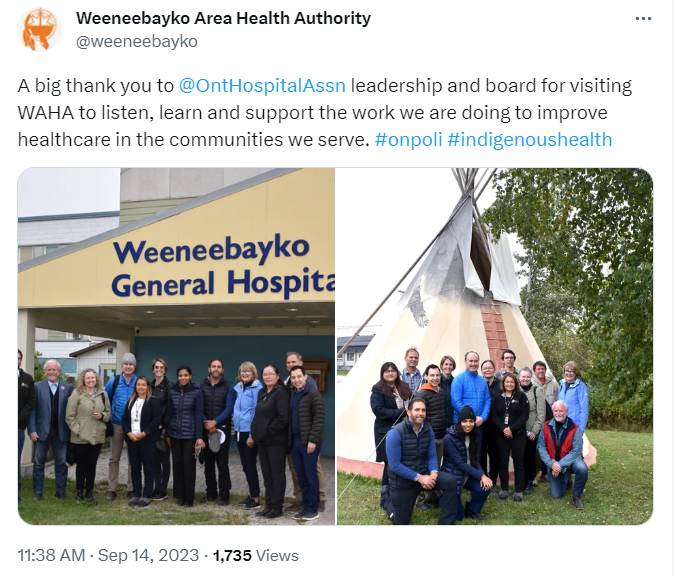 After four years, the OHA team resumed visits to member hospitals. This direct engagement with members is crucial for the OHA to continuously learn about the priorities of each hospital and how the OHA can best serve their needs, while gaining a system perspective on the sector's most challenging issues. Over the past several months, the team, including President and CEO Anthony Dale, visited hospitals in northern and southwestern Ontario. Most recently, several members of the OHA Board of Directors and OHA Leadership team travelled to the Weeneebyko Area Health Authority to learn more about their teams' experiences and needs.
After four years, the OHA team resumed visits to member hospitals. This direct engagement with members is crucial for the OHA to continuously learn about the priorities of each hospital and how the OHA can best serve their needs, while gaining a system perspective on the sector's most challenging issues. Over the past several months, the team, including President and CEO Anthony Dale, visited hospitals in northern and southwestern Ontario. Most recently, several members of the OHA Board of Directors and OHA Leadership team travelled to the Weeneebyko Area Health Authority to learn more about their teams' experiences and needs.
Information Sessions and Training for Members
Throughout the year, the OHA held information sessions on topical issues affecting hospitals. A special meeting of the Financial Leaders Network explored the financial implications of cybersecurity threats, and a separate session for hospital communicators shared advice from hospitals that have experienced a cybersecurity incident. The OHA also continued to host Risk Forums exclusively for OHA and HIROC members on evolving issues, such as independent health facilities, Ontario Health Teams, HHR, and access to care. Members also had the opportunity to participate in a virtual dialogue with Ontario's Information and Privacy Commissioner (IPC), Patricia Kosseim and IPC staff on emerging privacy concerns impacting the health sector and the IPC's regulatory approach in these matters.
In response to continued interest from hospitals for Ontario Healthcare Reporting Standards (OHRS) training, the OHA offered a new series of training sessions in 2022. Planning is underway to offer additional training in late 2023 and in 2024 to help members better understand OHRS financial and statistical data for reporting, how to analyze services and costs, and determine measures and outcomes.
New and Updated Member Resources
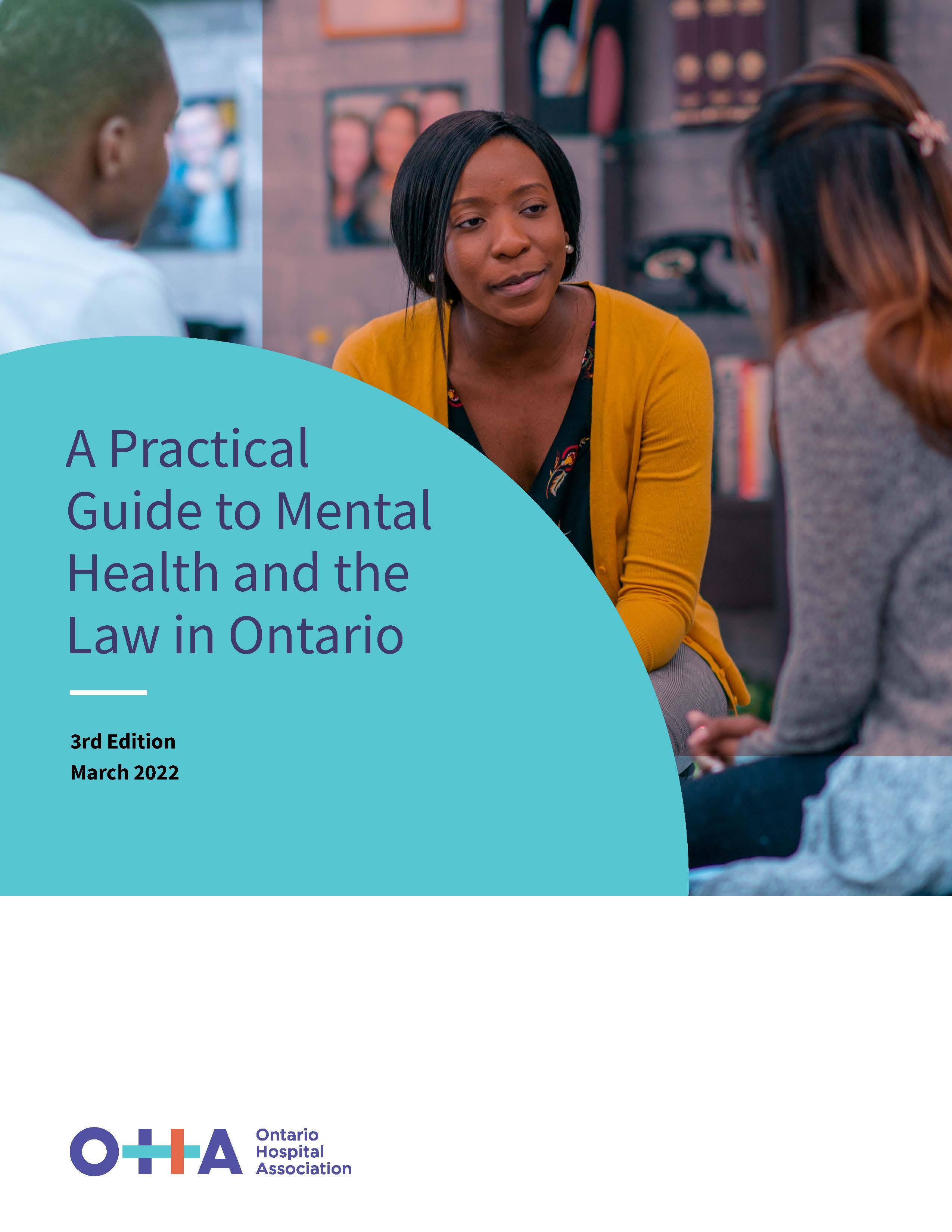 As part of its core service offerings, the OHA developed several resources in support of members on various issues. Together with Borden Ladner Gervais LLP, the OHA developed a guide for frontline mental health care providers, A Practical Guide to Mental Health and the Law. Now in its fourth edition, the guide provides readers with a general understanding of mental health law issues in several key areas. A virtual session was held to help outline key legislative updates within the guide and ensure members understood how to best use the guide in practice. The OHA also released the 2022 edition of the Records Retention Toolkit, which is intended to provide hospitals with a quick and practical reference to ensure compliance with legislative requirements for records retention. In fall 2022, the board self-assessment tool was, once again, offered free of charge to hospital members, featuring an improved reporting format that offers access to results through an online dashboard where participating organizations can view and benchmark their results using multiple criteria. To help hospital communicators better understand the impact of misinformation, the OHA published Misinformation in Health Care – The Critical Role of Effective Communication in May 2023. The research brief provides a range of tools and strategies to address misinformation and support the management of health infodemics. A virtual session on this topic is scheduled for October 2023.
As part of its core service offerings, the OHA developed several resources in support of members on various issues. Together with Borden Ladner Gervais LLP, the OHA developed a guide for frontline mental health care providers, A Practical Guide to Mental Health and the Law. Now in its fourth edition, the guide provides readers with a general understanding of mental health law issues in several key areas. A virtual session was held to help outline key legislative updates within the guide and ensure members understood how to best use the guide in practice. The OHA also released the 2022 edition of the Records Retention Toolkit, which is intended to provide hospitals with a quick and practical reference to ensure compliance with legislative requirements for records retention. In fall 2022, the board self-assessment tool was, once again, offered free of charge to hospital members, featuring an improved reporting format that offers access to results through an online dashboard where participating organizations can view and benchmark their results using multiple criteria. To help hospital communicators better understand the impact of misinformation, the OHA published Misinformation in Health Care – The Critical Role of Effective Communication in May 2023. The research brief provides a range of tools and strategies to address misinformation and support the management of health infodemics. A virtual session on this topic is scheduled for October 2023.